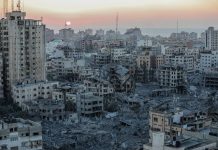-NATO, Washington say Ukraine war likely to end through talks
DM Monitoring
MOSCOW: Russian Foreign Minister Sergei Lavrov said the supply of U.S. advanced rocket launchers to Ukraine raised the risks of a “third country” being dragged into the conflict.
Lavrov was responding to a question at a news conference in Saudi Arabia about U.S. plans to provide Ukraine with advanced rocket systems that can strike with precision at long-range Russian targets.
President Joe Biden announced a new $700m US security assistance package to Ukraine on Wednesday.
The package provides the Ukrainians “with new capabilities and advanced weaponry”, Biden said in a statement, including medium-range rocket systems know as HIMARS.
Besides, Russia on Wednesday sharply criticized a U.S. decision to supply advanced rocket systems and munitions to Ukraine, warning it could widen the conflict and increase the risk of direct confrontation with Washington.
U.S. President Joe Biden has agreed to provide Ukraine with rockets that can strike with precision at long-range Russian targets as part of a new U.S. package to help Kyiv defend itself in the three-month-old war that began with Russia’s Feb. 24 invasion.
Kremlin spokesperson Dmitry Peskov told reporters: “We believe that the United States is purposefully and diligently adding fuel to the fire.”
Asked later if the U.S. move increased the chances of a third country becoming involved in the conflict, Foreign Minister Sergei Lavrov said: “Such risks certainly exist.”
He told a news conference in Saudi Arabia: “It is a direct provocation (by Ukraine), aimed at involving the West in military action.”
Meanwhile, top NATO and US officials said the war in Ukraine is likely to end at the negotiating table, but Ukrainians must be able to defend themselves to strengthen their position at peace talks. At a joint news conference in Washington, DC on Wednesday, Secretary of State Antony Blinken and NATO Secretary-General Jens Stoltenberg said the situation on the battlefield will affect how future negotiations will unfold. “Wars are unpredictable,” Stoltenberg told reporters. “We were able to predict the invasion, but how this war will evolve, it’s very hard to predict. What we do know is that almost all wars end at some stage at the negotiating table.” He added that NATO is supporting Ukraine’s right to self-defence while trusting the leadership in Kyiv to make its own judgement on talks with Moscow. Blinken echoed Stoltenberg’s remarks, saying, “What we’re working to do … is to make sure that the Ukrainians have in hand what they need to defend against this aggression, to repel it and push it back,” he said. “And as well, and as a result, to make sure that they have the strongest possible hand at any negotiating table that emerges.”
Blinken also said it is difficult to speculate on the trajectory of the conflict or when it will end.
“We can’t say when, we can’t say exactly how,” he said. “What we can say is what we will do to make sure that Ukraine has the means to defend itself and has the strongest possible hand at every step along the way.”
Russia launched its all-out invasion of Ukraine on February 24 after a months-long standoff that saw Moscow amass troops near the Ukrainian borders as Russian President Vladimir Putin demanded an end to NATO expansion into former Soviet republics.
After its failure to capture the capital, Kyiv, Moscow has scaled back its war objectives, shifting its war efforts to the eastern Donbas region and the southern parts of Ukraine.
The meeting between Blinken and Stoltenberg comes as Finland and Sweden push to join NATO after the Russian invasion of Ukraine.
The two Nordic countries’ bids for NATO accession have faced Turkish opposition that could prevent them from joining the alliance, as new allies must be approved by all 30 existing members.
Turkey has accused the European countries of providing a safe haven for “terrorists”, referring to the Kurdistan Workers’ Party (PKK). Poland and Sweden had also restricted arms sales to Ankara in 2019 after a Turkish military operation against Kurdish forces in northern Syria.
Ankara has said it needs to see “concrete steps” from Finland and Sweden to lift its opposition to their NATO membership.
On Wednesday, Stoltenberg said he is in “close contact” with Turkish President Recep Tayyip Erdogan as well as the leaders of Finland and Sweden to address Ankara’s concerns. “I will convene senior officials from all three countries in Brussels in the coming days,” he said.





